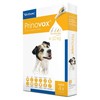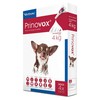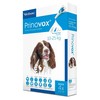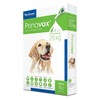Prinovox for Dogs
Prinovox Spot-On Solution for Dogs is a broad spectrum ectoparasiticide containing the industry-leading combination of Moxidectin and Imidacloprid.
It is licensed for the treatment and prevention of lungworm; for the treatment and prevention of fleas and also for lice, mites, heartworm and roundworms.
Prinovox Spot-On Solution for Medium Dogs
£22.45Prinovox Spot-On Solution for Medium Dogs is a broad spectrum parasiticide for average breed dogs weighing 4 - 10kg. It is for the treatment and prevention of lungworms, flea infestations,...[More info]
Prinovox Spot-On Solution for Small Dogs
£25.39Prinovox Spot-On Solution for Small Dogs is a broad spectrum parasiticide for smaller breed dogs weighing up to 4kg. It is for the treatment and prevention of lungworms, flea infestations,...[More info]
Prinovox Spot-On Solution for Large Dogs
£26.80Prinovox Spot-On Solution for Large Dogs is a broad spectrum parasiticide for larger breed dogs weighing 10 - 25kg. It is for the treatment and prevention of lungworms, flea infestations,...[More info]
Prinovox Spot-On Solution for Extra Large Dogs
£37.30Prinovox Spot-On Solution for Extra Large Dogs is a broad spectrum parasiticide for giant breed dogs weighing over 25kg. It is for the treatment and prevention of lungworms, flea...[More info]
Target species
Dogs
Indications for use
For dogs suffering from, or at risk from, mixed parasitic infections:
For the treatment and prevention of flea infestation (Ctenocephalides felis),
The treatment of biting lice (Trichodectes canis),
The treatment of ear mite infestation (Otodectes cynotis), sarcoptic mange (caused by Sarcoptes scabiei var. canis), demodicosis (caused by Demodex canis),
The prevention of heartworm disease (L3 and L4 larvae of Dirofilaria immitis),
The treatment of circulating microfilariae (Dirofilaria immitis),
The prevention of cutaneous dirofilariosis (L3 larvae of Dirofilaria repens),
The reduction of circulating microfilariae (Dirofilaria repens),
The prevention of angiostrongylosis (L4 larvae and immature adults of Angiostrongylus vasorum),
The treatment of Angiostrongylus vasorum and Crenosoma vulpis,
The prevention of spirocercosis (Spirocerca lupi),
The treatment of Eucoleus (syn. Capillaria) boehmi (adults),
The treatment of the eye worm Thelazia callipaeda (adults),
The treatment of infections with gastrointestinal nematodes (L4 larvae, immature adults and adults of Toxocara canis, Ancylostoma caninum and Uncinaria stenocephala, adults of Toxascaris leonina and Trichuris vulpis).
The product can be used as part of a treatment strategy for flea allergy dermatitis (FAD).
Contra-indications
Do not use in puppies under 7 weeks of age.
Do not use in animals that are known to be hypersensitive to the active substances or to any of the excipients.
Do not use in dogs classified as Class 4 for heartworm disease as the safety of the product has not been evaluated in this animal group.
For cats, the corresponding "Prinovox for cat" product, which contains 100 mg/ml imidacloprid and 10 mg/ml moxidectin, must be used.
For ferrets: Do not use Prinovox for dogs. Only "Prinovox for small cats and ferrets" (0.4 ml) must be used.
Special warnings for each target species
Brief contact of the animal with water on one or two occasions between monthly treatments is unlikely to significantly reduce the efficacy of the product. However, frequent shampooing or immersion of the animal in water after treatment may reduce the efficacy of the product.
Parasite resistance to any particular class of anthelmintic may develop following frequent, repeated use of an anthelmintic of that class. Therefore, the use of this product should be based on the assessment of each individual case and on local epidemiological information about the current susceptibility of the target species in order to limit the possibility of a future selection for resistance.
The use of the product should be based on the confirmed diagnosis of mixed infection (or risk of infection, where prevention applies) at the same time.
The product has not been shown to have an adulticidal effect against D. repens.
Special precautions for use
Special precautions for use in animals
The treatment of animals weighing less than 1 kg should be based on a risk-benefit assessment.
There is limited experience on the use of the product in sick and debilitated animals, thus the product should only be used based on a risk-benefit assessment for these animals.
Care should be taken that the content of the pipette or the applied dose does not come into contact with the eyes or mouth of the recipient and/or other animals. Do not allow recently treated animals to groom each other. When the product is applied in 3 to 4 separate spots, specific care should be taken to prevent the animal licking the application sites.
This product contains moxidectin (a macrocyclic lactone), therefore special care should be taken with Collies, Old English Sheepdogs and related breeds or crossbreeds, to correctly administer the product as described under dosage schedule; in particular, oral uptake by the recipient and/or other animals in close contact should be prevented.
The product should not enter water courses as it has harmful effects on aquatic organisms: moxidectin is highly toxic to aquatic organisms. Dogs should not be allowed to swim in surface waters for 4 days after treatment.
The safety of the product has only been evaluated in dogs classified as either Class 1 or 2 for heartworm disease in laboratory studies and in a few Class 3 dogs in a field study. Therefore the use in dogs with obvious or severe symptoms of the disease should be based on a careful benefit risk assessment by the treating veterinarian.
Although experimental overdosage studies have shown that the product may be safely administered to dogs infected with adult heartworms, it has no therapeutic effect against adult Dirofilaria immitis. It is therefore recommended that all dogs 6 months of age or more, living in areas endemic for heartworm, should be tested for existing adult heartworm infection before being treated with the product. At the discretion of the veterinarian, infected dogs should be treated with an adulticide to remove adult heartworms. The safety of this product has not been evaluated when administered on the same day as an adulticide.
Adverse reactions
Use of the product may result in transient pruritus in dogs. On rare occasions greasy hair, erythema and vomiting can occur. These signs disappear without further treatment. The product may, in rare cases, cause local hypersensitivity reactions. If the animal licks the application site after treatment, neurological signs (most of which are transient) may be observed in very rare cases.
The product tastes bitter. Salivation may occasionally occur if the animal licks the application site immediately after treatment. This is not a sign of intoxication and disappears within some minutes without treatment. Correct application will minimise licking of the application sites.
The product may in very rare cases cause at the application site a sensation resulting in transient behavioural changes such as lethargy, agitation, and inappetence.
A field study has shown that in heartworm positive dogs with microfilaraemia there is a risk of severe respiratory signs (coughing, tachypnea and dyspnea) that may require prompt veterinary treatment. In the study these reactions were common (seen in 2 of 106 treated dogs). Gastrointestinal signs (vomiting, diarrhoea, inappetence) and lethargy are also common adverse reactions following treatment in such dogs.
Use during pregnancy, lactation or lay
The safety of the veterinary medicinal product has not been established during pregnancy and lactation. Laboratory studies with either imidacloprid or moxidectin in rats and rabbits have not produced any evidence of teratogenic, foetotoxic or maternotoxic effects.
Use only according to the benefit-risk assessment by the responsible veterinarian.
Interactions
During treatment with this veterinary medicinal product no other antiparasitic macrocyclic lactone should be administered.
No interactions between this veterinary medicinal product and routinely used veterinary medicinal products or medical or surgical procedures have been observed.
Safety of this veterinary medicinal product when administered on the same day as an adulticide to remove adult heartworms has not been evaluated.
Overdose
Up to 10 times the recommended dose was tolerated in adult dogs with no evidence of adverse effects or undesirable clinical signs. Five times the recommended minimum dose applied at weekly intervals for 17 weeks was investigated in dogs aged over 6 months and tolerated with no evidence of adverse effects or undesirable clinical signs.
The product was administered to puppies at up to 5 times the recommended dose, every 2 weeks for 6 treatments, and there were no serious safety concerns. Transient mydriasis, salivation, vomiting and transient rapid respiration were observed.
After accidental oral ingestion or overdose, neurological signs (most of which are transient) such as ataxia, generalised tremors, ocular signs (dilated pupils, little pupillary reflex, nystagmus), abnormal respiration, salivation and vomiting may occur in very rare cases.
Ivermectin-sensitive Collie dogs tolerated up to 5 times the recommended dose repeated at monthly intervals without any adverse effects, but the safety of application at weekly intervals has not been investigated in ivermectin-sensitive Collie dogs. When 40 % of the unit dose was given orally, severe neurological signs were observed. Oral administration of 10 % of the recommended dose produced no adverse effects.
Dogs infected with adult heartworms tolerated up to 5 times the recommended dose, every 2 weeks for 3 treatments, without any adverse effects.
In case of accidental oral uptake, symptomatic treatment should be administered. There is no known specific antidote. The use of activated charcoal may be beneficial.
Excipients
Butylhydroxytoluene E321
Benzyl alcohol
Propylene carbonate




